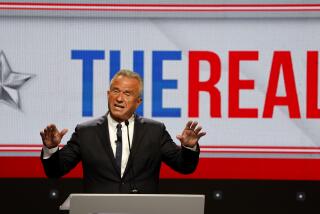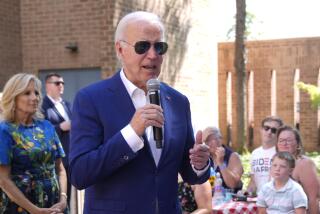Battlefront Shifts to West Virginia
- Share via
CHARLESTON, W.Va. — Sen. John F. Kerry campaigned Tuesday to retake this mountainous state for his party, but ran into direct criticism from the White House, where President Bush questioned his assertion that leaders abroad are privately hoping the Democrat defeats him in the fall.
The Bush-Cheney reelection campaign, meanwhile, pursued Kerry in West Virginia with a new television commercial that attacks his Senate vote against funding the U.S. military occupation of Iraq.
The clashes between the Republican incumbent and his challenger, the latest in what has become a daily series of thrusts and counters, was one of their most intense exchanges since the Massachusetts senator all but clinched his party’s nomination March 2. And it came on a day when Kerry announced that he had secured the number of delegates needed to become the official Democratic Party nominee.
During a brief session with reporters in the Oval Office, the president responded sharply to a question about the senator’s claim last week that he had significant support from abroad.
“If you’re going to make an accusation in the course of a presidential campaign, you ought to back it up with facts,” Bush said.
In Denver, Vice President Dick Cheney added in a campaign speech, “We are the ones who get to determine the outcome of this election -- not unnamed foreign leaders.”
Republicans have been hammering Kerry about the comment for days, but the presumptive Democratic nominee has refused to identify any leaders he has communicated with abroad, saying he does not want to betray their confidence.
On Tuesday, Kerry continued to stress his military experience and accused the Bush administration of failing the country’s veterans.
Campaigning in West Virginia, home to 203,000 veterans, he brought along seven of the men he served with in Vietnam, introducing them as his “band of brothers.”
The audience, made up largely of veterans, gave them a standing ovation.
“This administration is shortchanging veterans for the reason that they want to make their tax cut permanent and they think it’s more important to give people earning more than $200,000 a year a tax break,” the senator said at a town hall meeting attended by about 150 people in Huntington.
Kerry’s stop in West Virginia underlined the state’s importance in the fall election. With neighboring Ohio and Pennsylvania, it is among several Midwestern and mid-Atlantic states likely to get substantial attention from both parties.
Bush won the state’s five electoral votes in 2000 by a surprising margin of 6 percentage points, the first time since 1928 that a Republican who was not an incumbent president had carried West Virginia. President Reagan last claimed it for the GOP in 1984.
Bush has worked diligently to keep the state in his column. Early in his term he imposed tariffs on steel imports to help protect industry here. He also has sought to promote coal-mining interests that drive the local economy.
Kerry hopes to win the state back with a Vietnam War resume he believes will appeal to veterans and their families. West Virginia, with 15.4% of its adult population having served in the military, is home to more veterans per capita than all but Alaska, Montana, Nevada and Wyoming.
But the Bush campaign sought Tuesday to undermine Kerry’s military credentials with an ad tailor-made for West Virginia. It portrays Kerry as a lawmaker who has flip-flopped on national defense.
“Few votes in Congress are as important as funding our troops at war,” the narrator says in the ad. “Though John Kerry voted in October 2002 for military action in Iraq, he later voted against funding our soldiers.”
The narrator then cites three items in the $87.5-billion bill Congress approved last fall for the reconstruction and occupation of Iraq and Afghanistan: body armor for combat troops, higher combat pay and healthcare benefits for reservists.
Each time, a Senate clerk asks “Mr. Kerry” in the roll call and a voice answers, “No,” signifying Kerry’s vote
Kerry has said he voted for the congressional resolution authorizing the use of force against Iraq to give the administration diplomatic leverage against now-deposed Iraqi President Saddam Hussein. Since then, he has criticized Bush for failing to build a broader coalition to support the Iraq invasion and occupation.
But Kerry also exposed himself to criticism with his vote on Oct. 17 against the $87.5-billion bill. He was one of 11 Democratic senators in opposition.
Bush, with his ad, essentially resumed a line of attack first raised by Democratic rivals in the presidential race -- they accused Kerry of trying to straddle pro- and antiwar views.
Kerry, accusing Bush of “distortion,” said he supported a version of the reconstruction bill that would have offset the price tag by rolling back tax cuts for the wealthiest Americans.
“I actually did vote for the $87 billion, before I voted against it,” the senator said.
Howard Dean, a former Democratic presidential candidate who is now backing Kerry, came to his defense.
In a conference call with reporters, Dean drew a contrast between Kerry’s Vietnam service as a decorated Navy lieutenant and Bush’s record during that war as a pilot in the Texas Air National Guard “who never served a day in combat.”
Dean charged that Bush had sent U.S. troops into Iraq without needed equipment. “This president doesn’t have a leg to stand on when it comes to supporting our troops, because he hasn’t,” the former Vermont governor said.
Kerry picked up more new delegates Tuesday, as voters in Illinois held their Democratic presidential primary.
Associated Press reported over the weekend that he had surpassed 2,162 delegates, the number needed to win the party nomination. But Kerry’s campaign has used a more conservative count of “super delegates,” which include elected officials and party leaders, who can endorse a presidential candidate independently.
Kerry on Tuesday touted his new delegate count, which he said now shows him with the necessary number of delegates to claim the nomination.
His aides billed the night as the kickoff of the general election contest between the Republican incumbent and his challenger.
Kerry’s speech struck a rare bipartisan note, addressing the global battle against terrorists days after an attack in Spain cast a shadow over that country’s national elections Sunday.
“As we begin this general election, there is one message that I want all Americans to hear, and I want the friends and enemies of America to hear,” Kerry said. “When it comes to protecting the security of our nation and to winning the war on terror, America is unified. And we are determined.”
He added, “We may disagree on how best to achieve that security, but no matter what the outcome of this election, we will stand as one country when it comes to protecting the security of our nation.”
Times staff writer Edwin Chen contributed to this report. Anderson reported from Washington and Gold from West Virginia.
*
(BEGIN TEXT OF INFOBOX)
Primary results
Illinois
John F. Kerry 72%
John Edwards* 11%
Carol Moseley Braun* 4%
Howard Dean* 4%
Al Sharpton 3%
Dennis J. Kucinich 2%
Joe Lieberman* 2%
Wesley K. Clark* 2%
Dick Gephardt Not on ballot
93% reporting
Source: Associated Press
Los Angeles Times
* Delegate count
Here is the breakdown of presidential preferences of delegates to the Democratic National Convention. It includes choices by “super delegates,” those not picked through primaries or caucuses and who can change their minds.
Needed to nominate: 2,162
Candidate Delegates
Kerry 2,252
Edwards* 528
Dean* 156
Clark* 73
Sharpton 26
Kucinich 22
Lieberman* 2
Gephardt* 2
Other 1
*Candidates who have dropped out.
Source: Associated Press
Los Angeles Times
More to Read
Get the L.A. Times Politics newsletter
Deeply reported insights into legislation, politics and policy from Sacramento, Washington and beyond. In your inbox twice per week.
You may occasionally receive promotional content from the Los Angeles Times.










